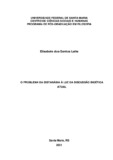| dc.creator | Leite, Elisabete dos Santos | |
| dc.date.accessioned | 2021-12-17T15:00:35Z | |
| dc.date.available | 2021-12-17T15:00:35Z | |
| dc.date.issued | 2021-02-26 | |
| dc.identifier.uri | http://repositorio.ufsm.br/handle/1/23360 | |
| dc.description.abstract | This dissertation consists of an introductory presentation on "the problem of
dysthanasia in the light of the current bioethical discussion", a specific theme of
biomedical ethics. The analysis begins by exposing the context of medicine that, due
to significant scientific advances, death is no longer a natural outcome and has become
an enemy that must be overcome at any cost. The main objective of the research is to
clarify what are the possible solutions in the case of moral dilemmas of dysthanasia.
The most important discussion was the question about: to what extent can the doctor
stay only on the basis of a deontological morality to define the best moral choice and
what is the role of emotions for a truly moral action? The exhibition follows the following
steps: As a point of reference, I analyze the perspective of the old deontological ethics
in contrast to the new bioethical propedeutics, from a historical and conceptual
contextualization of the central issues of bioethics, medical ethics and hypocratic
ethics. I intend to show the different meanings or perspectives of a series of systematic
questions that at first glance seems to suggest a discussion of practical questions of
the application of certain rules, but it is not so easy to decide which reasons and criteria
guarantee a certain form application, a concrete medical practice of a moral character.
Second, I analyze philosophically the technoscientific, commercial-business and
humanitarian paradigms as a way to better understand dysthanasia. Third, I present
the fundamental perspective of current bioethics with an exposition of the new
biomedical ethics and the relativization of hypocratic morals. Finally, even though there
is still great difficulty in defining answers in this new perspective of bioethical
investigation, I concluded by the need to respect the patient's right to autonomy, with
emphasis on the substantial or evaluative aspects surrounding empathic engagement
in the doctor-patient relationship. | eng |
| dc.language | por | por |
| dc.publisher | Universidade Federal de Santa Maria | por |
| dc.rights | Attribution-NonCommercial-NoDerivatives 4.0 International | * |
| dc.rights.uri | http://creativecommons.org/licenses/by-nc-nd/4.0/ | * |
| dc.subject | Distanásia | por |
| dc.subject | Ética médica | por |
| dc.subject | Bioética atual | por |
| dc.subject | Dysthanasia | eng |
| dc.subject | Medical ethics | eng |
| dc.subject | Current bioethics | eng |
| dc.subject | Dysthanasia | eng |
| dc.subject | Medical ethics | eng |
| dc.subject | Current bioethics | eng |
| dc.title | O problema da distanásia à luz da discussão bioética atual | por |
| dc.title.alternative | The distances problem in the light of current bioethical discussion | eng |
| dc.type | Dissertação | por |
| dc.description.resumo | A presente dissertação consiste numa apresentação introdutória sobre "o problema
da distanásia à luz da discussão bioética atual", temática específica da ética
biomédica. A análise inicia expondo o contexto da medicina que, devido aos
significativos avanços científicos, a morte deixou de ser um desfecho natural e
transformou-se em inimiga que deve ser vencida a qualquer custo. O objetivo central
da pesquisa é esclarecer quais as possíveis soluções no caso de dilemas morais da
distanásia. Teve como discussão mais importante a questão sobre: até que ponto o
médico pode ficar apenas na base de uma moral deontológica para definição sobre a
melhor escolha moral e qual o papel das emoções para uma ação propriamente
moral? A exposição segue as seguintes etapas: como ponto referencial, analisa-se a
perspectiva da velha ética deontológica em contraponto com a nova propedêutica
bioética, a partir de uma contextualização histórica e conceitual das questões centrais
da bioética, ética médica e ética hipocrática. Pretende-se mostrar os diversos sentidos
ou perspectivas de uma série de questões sistemáticas que, à primeira vista, parecem
sugerir ser uma discussão de questões práticas da aplicação de certas regras, mas
não é assim tão fácil decidir quais os motivos e critérios que garantam uma
determinada forma de aplicação, uma concreta prática médica de caráter moral. Em
segundo lugar, analisa-se filosoficamente os paradigmas tecnocientífico, comercialempresarial
e humanitário como forma de melhor compreensão da distanásia. Em
terceiro lugar, apresenta-se a perspectiva fundamental da bioética atual com
exposição da nova ética biomédica e a relativização da moral hipocrática. Por fim,
mesmo que ainda exista grande dificuldade em respostas definitivas nessa nova
perspectiva da investigação bioética, conclui-se pela necessidade de respeito ao
direito a autonomia do paciente, com ênfase nos aspectos substanciais ou valorativos
em torno do engajamento empático na relação médico-paciente. | por |
| dc.contributor.advisor1 | Hamm, Christian Viktor | |
| dc.contributor.advisor1Lattes | http://lattes.cnpq.br/5301026925485532 | por |
| dc.contributor.referee1 | Williges, Flavio | |
| dc.contributor.referee2 | Chagas, Flávia | |
| dc.creator.Lattes | http://lattes.cnpq.br/3003775814665759 | por |
| dc.publisher.country | Brasil | por |
| dc.publisher.department | Filosofia | por |
| dc.publisher.initials | UFSM | por |
| dc.publisher.program | Programa de Pós-Graduação em Filosofia | por |
| dc.subject.cnpq | CNPQ::CIENCIAS HUMANAS::FILOSOFIA | por |
| dc.publisher.unidade | Centro de Ciências Sociais e Humanas | por |



